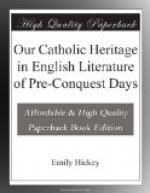But there is a better way of love than all of these. One may love the book through which one holds communion with the spirit of its writer, being ready to learn from him by direct learning, or by the learning received through suggestion, or through the rousing of the spirit of enquiry, or the spirit of opposition. Is not this the best kind of love, the love by which the thought of man is used by man, the spirit of man holds communion with the spirit of man?
All through the ages, great things have been handed down by written words, and people of all nations have shared one another’s national heritage of written thought, and in that sharing made it larger and greater. We are now considering the earlier story of English Catholic literature, and it is surely well that people should know something of what things were said and sung in the olden time; the time when all art, all literature was fed by the great Mother of all Christian art and all Christian literature, the Holy Catholic Church.
You will find our Catholic literature saturated with sacred lore and knowledge of Holy Scripture. Before printing was invented people could not multiply copies of the Sacred Books as they can now, but they knew them probably much better than many of those who can easily now buy them for a few pence. We have translations of various parts of the Bible in these early times. You will remember how in St Bede’s last days he finished his translation of part of St John’s Gospel. We have lovely manuscripts, such as that of the Lindisfarne Gospels, written in fine clear writing, which can be seen at the British Museum; and facsimiles of parts of them can be had for a small sum. It is simply an uneducated error to suppose that the heretical editing, as I may call it, of Holy Scripture in the mother-tongue of English people, made by Tyndale and Coverdale, was the first attempt to put the Bible into English. We should have had plenty of printed copies of Holy Scripture in the mother-tongue of English people, had these versions never been made and circulated to attack and injure Holy Church, without whom the originals could never have existed.
CHAPTER XIV
Scattering of our old MSS. in Sixteenth Century.
Same now in public
libraries. Collections.
Exeter Book and Vercelli Book.
Where are all our old manuscripts, our treasures from days of yore, the work of the cunning scribe, the pages whereon so many of our religious spent hour after hour, in patient and loving toil? They were scattered abroad in the sixteenth century by wholesale. Many of them found their way into private collections, and the collectors often generously gave them to college libraries. Matthew Parker, the Protestant Archbishop of Canterbury, was a great book-collector, and gave a good many volumes to Corpus Christi College at Cambridge. Among these is the oldest copy of the Anglo-Saxon Chronicle. John Bale, once a friar, afterwards, alas! a Protestant Bishop, says that some of the books from the monasteries were used to scour candlesticks or to rub boots; some were sold to grocers and soap-vendors; and whole ships-full went abroad.




